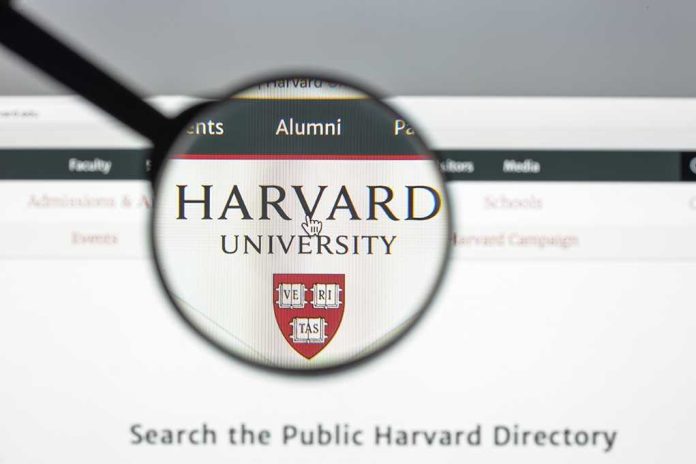
President Trump has frozen over $2 billion in federal funding to Harvard University, setting the stage for a monumental legal battle that could reshape the relationship between elite universities and government funding for generations to come.
Key Takeaways
- President Trump has frozen more than $2 billion in grants and contracts to Harvard University over its failure to address campus antisemitism and comply with anti-discrimination laws.
- Sixteen state attorneys general have filed an amicus brief supporting President Trump’s actions, citing legal precedent from a 1980s Supreme Court case involving Bob Jones University.
- Harvard, despite possessing the nation’s largest endowment of approximately $50 billion, has sued the Trump administration claiming the funding cuts are retaliatory and violate the First Amendment.
- The administration is using multiple approaches to hold elite universities accountable, including freezing federal grants, threatening tax-exempt status, and leveraging accreditation requirements.
- A federal judge has temporarily blocked some of the administration’s actions, though the legal battle continues with significant implications for university funding nationwide.
Trump Administration Takes Bold Stand Against Campus Antisemitism
The Trump administration has taken decisive action against Harvard University by freezing over $2 billion in federal grants and contracts, citing the university’s failure to address rampant antisemitism on campus. This move represents one of several approaches the administration is employing to hold elite educational institutions accountable for their handling of discrimination against Jewish students. The funding freeze comes amid growing concerns about hostile environments for Jewish students at prestigious universities across the country, with Harvard being singled out for its particularly problematic response to antisemitic incidents following the October 7th Hamas attacks on Israel.
President Trump’s approach has garnered significant support from conservative state officials, with Iowa Attorney General Brenna Bird leading a coalition of sixteen state attorneys general who have filed an amicus brief supporting the administration’s actions. The legal filing emphasizes that federal funding comes with obligations that universities cannot simply ignore, particularly when it comes to protecting students from discrimination. This coalition of states is standing firmly behind the President’s efforts to ensure that taxpayer dollars do not support institutions that fail to uphold basic principles of fairness and equal treatment for all students.
“That’s exactly what’s happening here with Harvard; they’re not following anti-discrimination laws, and they’re not stopping antisemitism on campus or protecting Jewish students and Israeli students, and so, because of that, there’s a big parallel,” Bird said.
Legal Precedent and Constitutional Questions
The Trump administration’s legal position draws strength from a significant Supreme Court precedent involving Bob Jones University. In that 1980s case, the high court upheld the federal government’s decision to revoke the university’s tax-exempt status due to its ban on interracial relationships, which violated anti-discrimination laws. This precedent establishes that the government can indeed withhold benefits from educational institutions that engage in discriminatory practices, providing a strong foundation for the current actions against Harvard. The attorneys general supporting President Trump have emphasized this parallel in their legal filings, arguing that Harvard’s failure to address antisemitism represents a similar violation of civil rights protections.
Good evening Patriots! Hope everyone had a great Friday.
The Trump administration has asked the IRS to revoke Harvard University’s tax-exempt status, citing disputes over the university’s handling of antisemitism and diversity practices. This mental institution allowed it's… pic.twitter.com/hNsojNouED— The_Patriot_Guy (@The_Patriot_Guy) May 3, 2025
Harvard has responded by filing its own lawsuit against the Trump administration, claiming that the funding cuts are retaliatory and violate the First Amendment. The university’s leadership has argued that the administration failed to follow proper procedures before imposing such severe financial penalties. “We need to be firm in our commitments to what we stand for. And what we stand for – I believe I speak for other universities – is education, pursuit of the truth, helping to educate people for better futures,” said Harvard President Alan Garber.
Harvard’s Vast Resources and Federal Dependency
Harvard’s position in this legal battle is complicated by its enormous financial resources. With an endowment of approximately $50 billion – the largest of any university in the nation – Harvard’s financial stability is not immediately threatened by the funding freeze. However, the $2 billion in federal grants represents significant research funding that supports many of the university’s most prestigious programs and academic initiatives. The Trump administration has strategically targeted this vulnerability, demonstrating that even the wealthiest institutions remain dependent on federal support for their research enterprises and academic standing.
“One of those conditions for that type of funding is that they’re going to follow anti-discrimination-wise,” Bird said.
In addition to the funding freeze, President Trump has threatened to revoke Harvard’s tax-exempt status, a move that would have even more substantial financial implications for the university. Congress has already passed legislation taxing university endowments, and recent proposals would increase this tax further, potentially creating additional financial pressure on elite institutions like Harvard. These multi-faceted approaches demonstrate the administration’s determination to use every available tool to address what it sees as ideological bias and discrimination on college campuses.
Broader Implications for Higher Education
The legal confrontation between President Trump and Harvard has significant implications for higher education institutions nationwide. As the case progresses through the courts, it will likely establish new boundaries regarding the federal government’s authority to enforce anti-discrimination laws through funding mechanisms. Universities across the country are closely watching this battle, recognizing that the outcome could reshape their relationship with federal funding sources for decades to come. The administration’s approach signals a clear message that institutions receiving taxpayer dollars will be held accountable for creating environments where all students, regardless of background or identity, are protected from discrimination.
Critics of the administration’s approach have raised concerns about procedural issues. “The Trump administration has failed to follow any of the required procedures. These are not mere procedural technicalities, because in the absence of the required procedures, there is no way of validating the substantive allegations of ongoing civil rights violations,” said Michael Dorf.
While a federal judge has temporarily blocked some of the administration’s actions against Harvard, citing potential irreparable harm to the university, the core legal questions remain unresolved. This temporary injunction merely pauses the immediate effects of the funding freeze while the courts consider the fundamental constitutional and statutory issues at stake. For conservative Americans concerned about the ideological capture of elite educational institutions, President Trump’s willingness to confront Harvard represents a long-overdue challenge to the status quo in higher education.



